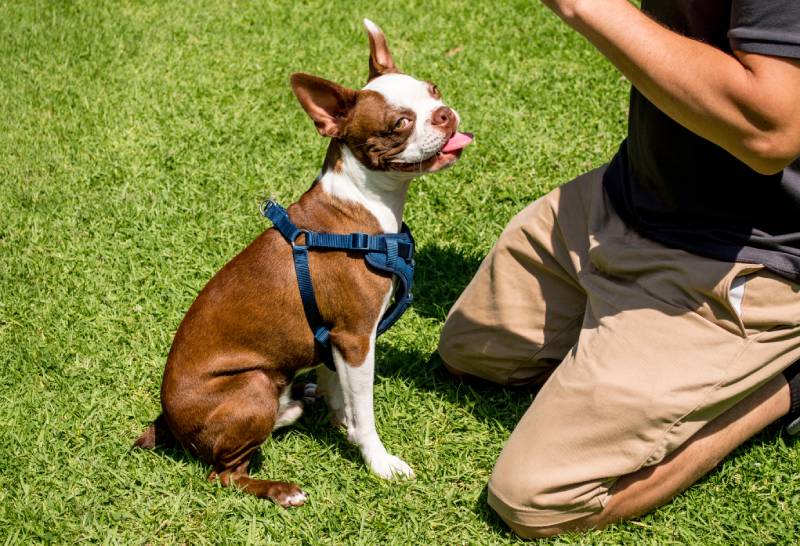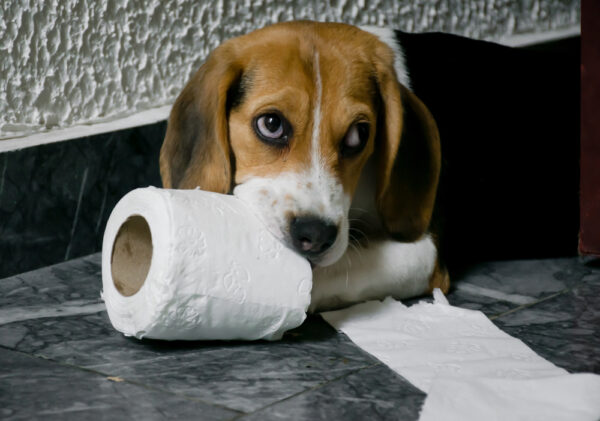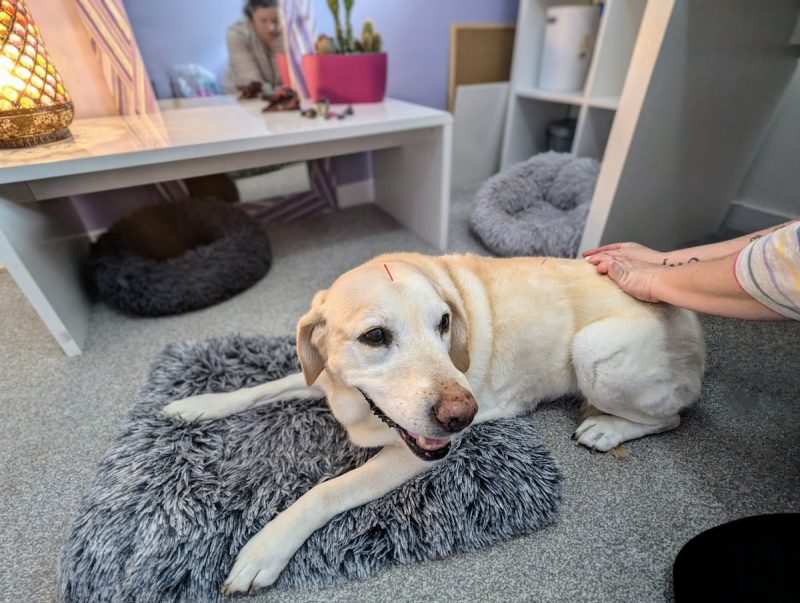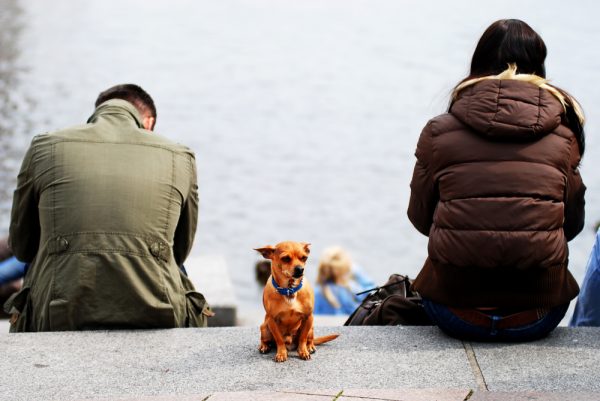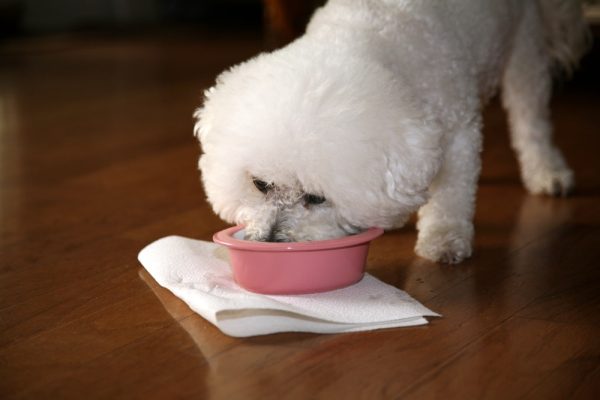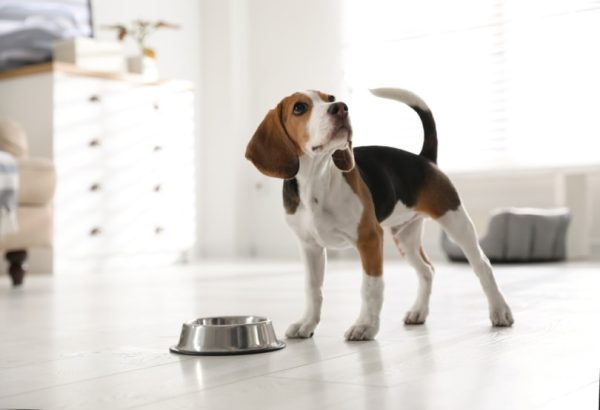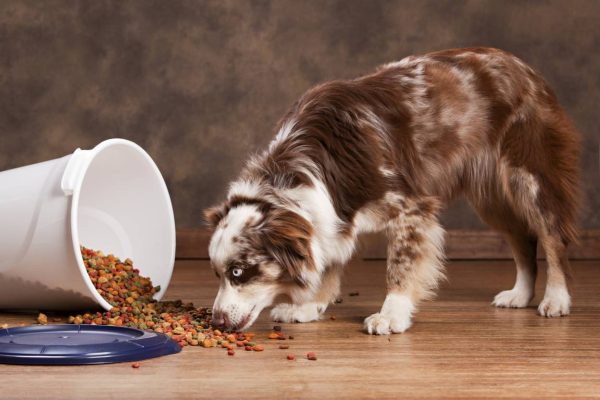If you’re bringing a new puppy into your home, you know accidents are going to happen. Puppies aren’t born potty trained. This means it’s up to you to take on that task as new puppy parents. If you’ve decided to bring a Boston Terrier into your home, you’re probably hoping potty training will be easy. Luckily, this breed is considered a very intelligent breed that is easy to train if you start early and stay consistent. You also have us to help you. Below, we’re going to discuss how to potty train a Boston Terrier and a few tips and tricks that could make things easier.

How to Potty Train a Boston Terrier
1. Gather All Your Supplies
Before you ever bring your puppy home you should have all the tools necessary to not only care for them but to get their training started. Everyone uses different tools for training. Some people have bells or clickers to use when working with dogs. Others use crate training as a way to make potty training easier. Puppy pads can also be useful. You should also remember that potty training gets messy so have cleaners and poop bags handy before you ever get started.
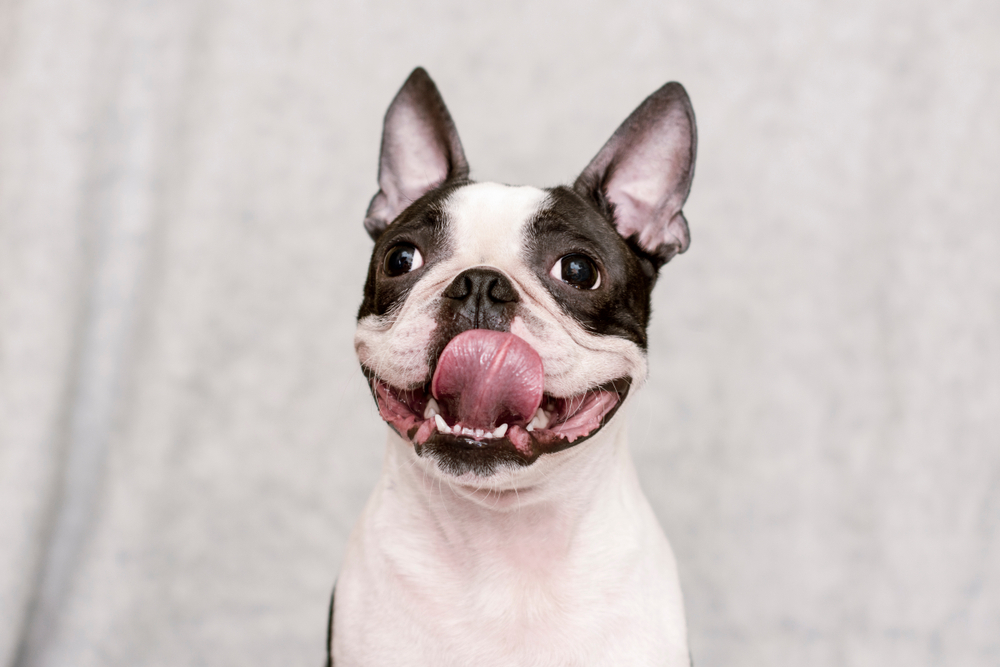
2. Choose a Location
There are situations where people need their pets to potty on puppy pads inside the home instead of going outside. If that’s your situation, choose the area of the house you want your Boston Terrier to eliminate and stick with it. If you can allow your pooch outdoors to use, location is still important. Will they simply go to the backyard? Will you walk them to a certain area nearby? Make your plans and start working on your consistency early on.
3. Make a Schedule
Consistency is very important when training any puppy. Boston Terriers are no different. This will help the two of you form a bond, make life easier for both you and your puppy, and get your pup used to what you expect from them. Let’s take a look at things you should schedule to make potty training and life in general with a puppy easier.
- Feeding times – Puppies need to go potty 5 to 30 minutes after their meals. If you keep feeding time on a strict schedule, this helps your dog learn to expect potty time to come shortly after.
- Potty breaks – Yes, potty breaks should be consistent. You’ll want to take your puppy out first thing in the morning and right before bed at night. You’ll also need to take them after they wake from naps, when they drink a lot of water, after playtimes, and anytime you see your puppy sniffing or pacing.
- Crate times – If you use a crate for your dog, crate times should be scheduled and consistent. This helps with potty training thanks to dogs not wanting to eliminate where they sleep.
- Play times – Puppies need a lot of stimulation to burn off calories. They’ll also need to potty afterward. Try to keep playtime on a schedule to help your puppy learn consistency and expect a potty break once they finish.
- Bedtime – Yes, even for a puppy, bedtime should be consistent. Make sure you take them to the potty beforehand, then get them settled for the night.
- Nighttime breaks – For young puppies, you’ll need to initiate nighttime breaks for the potty. Puppies have less control. Choose times that work with the rest of your schedule and set an alarm so things stay consistent.
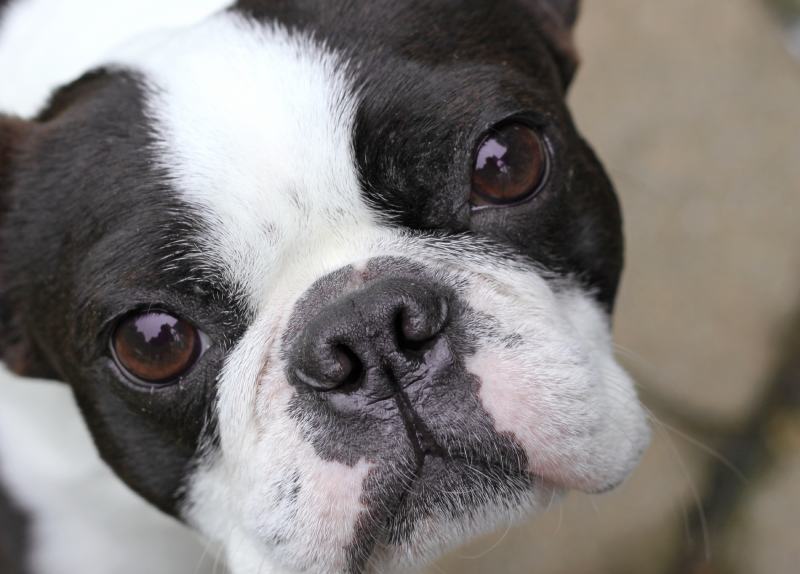
4. Limit Your Dog’s Access
You can’t have your eyes on your Boston Terrier every minute of the day when they are potty training. This means you can miss an act of urgency like sniffing or pacing. To avoid issues with accidents all around the house, it’s best to limit your puppy’s access to all areas. Use a particular area with access to your puppy’s crate, their toys, and anything else they may need. This is where puppy pads and other tools come in handy. If you need additional advice on how to potty train your dog, we recommend speaking with a vet.
If you need to speak with a vet but can't get to one, head over to PangoVet. It's our online service where you can talk to a vet online and get the advice you need for your pet — all at an affordable price!

5. Learn Your Dog’s Potty Signs
There are certain things dogs do when they need to go potty. You’ll even notice things your dog does that are unique to them. You need to learn these signs and react to them when your dog is displaying them. You can’t slack on taking your dog out when it needs to and then be upset with your pup for having an accident.
- Sniffing
- Circling and pacing
- Acting restless
- Squatting
- Being distracted easily
- Whimpering, whining, or barking
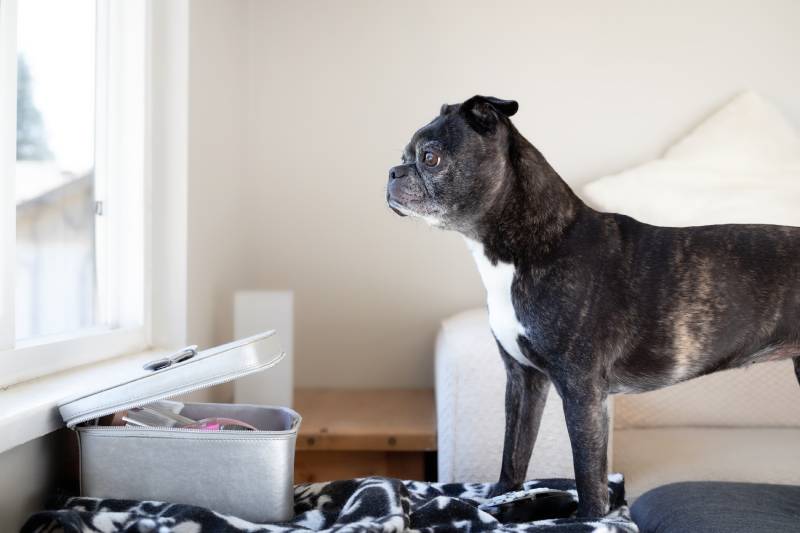
6. Use a Verbal Cue
Cue words are great ways to communicate what you expect from your dog. When it comes to choosing a potty training cue word, keep in mind, this should be used the entire time you have your dog. “Go potty” and “do your business” are popular options. This is your dog and your potty training, though. You can choose any phrase you like. The key is to use it each time your dog goes potty so they associate it with what they are doing.
7. Praise Your Dog
Each time your dog goes potty, they deserve praise. Boston Terriers want nothing more than to please you. When they successfully go to the chosen spot and relieve themselves, give them lots of love and “good boys” or “good girls.” If you want to use treats with potty training, they can be a useful tool as well.
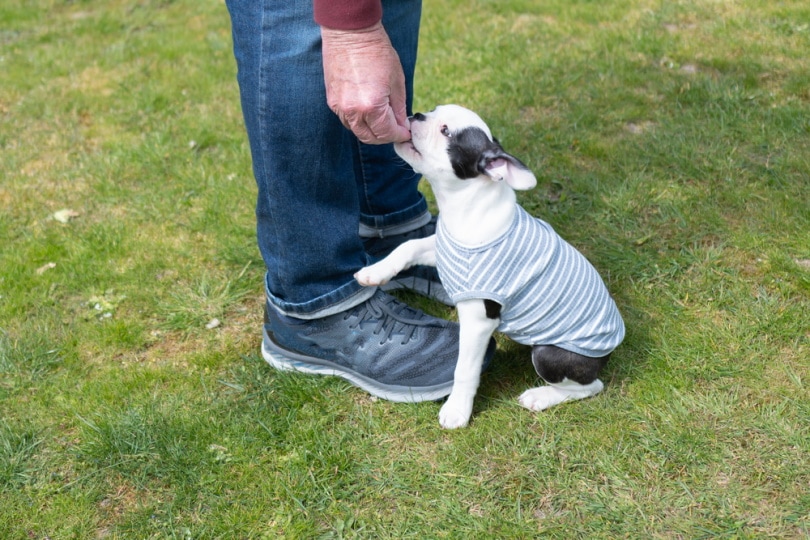
8. Always Supervise
As your puppy grows a bit you may want to let them trot outside while you do something real quick in the house. This isn’t a good idea, however. You need to be there with your puppy while they are potty training. Your puppy may simply run outside and not potty. They could also get confused as to why you aren’t there to use the cue word or praise them for doing a good job.
9. Learn How to Deal with Accidents
It can be frustrating when your Boston Terrier has an accident. It’s going to happen, however. When you see your puppy squat or relieve themselves in the house, tell them no sternly or use nope. It also helps to clap your hands to alert your dog to them doing wrong. You must not yell, scream, or scare your pooch.
If you find an accident that you didn’t witness, don’t punish your Boston Terrier. They won’t understand what’s happening at this point. All you’ll do is strain the relationship between you and your pup. Instead, clean the mess thoroughly and watch that spot for a repeat of the problem.
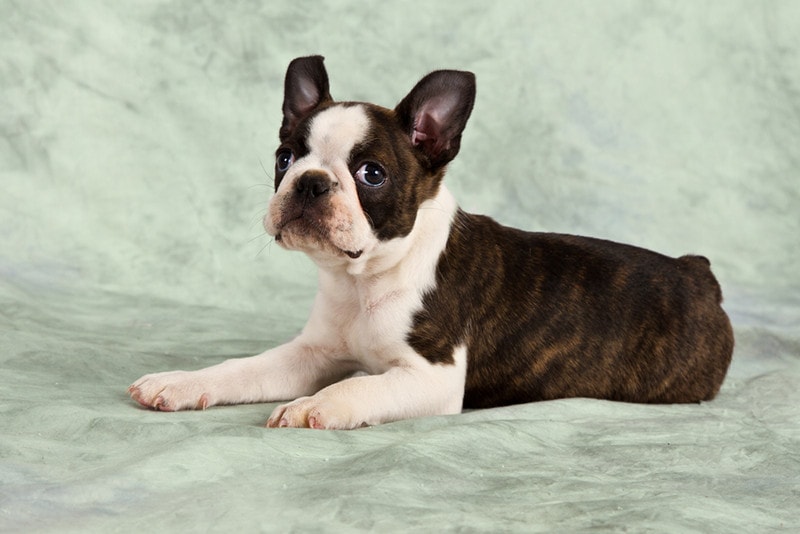

Final Thoughts
Potty training your Boston Terrier isn’t the easiest thing in the world, but it doesn’t have to be so stressful. If you can keep your cool and stay consistent, these little dogs will do their best to make you happy. The tips and tricks above can help you accomplish your goals. Before long, you and your Boston Terrier will be on a solid schedule that works out great for both of you.
Featured Image Credit: LI Cook, Shutterstock
